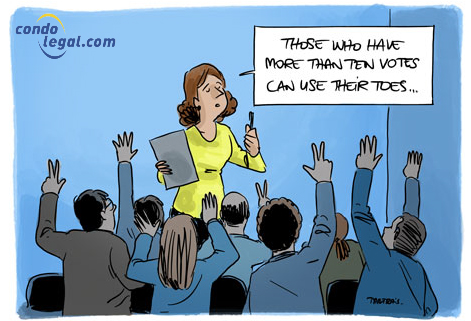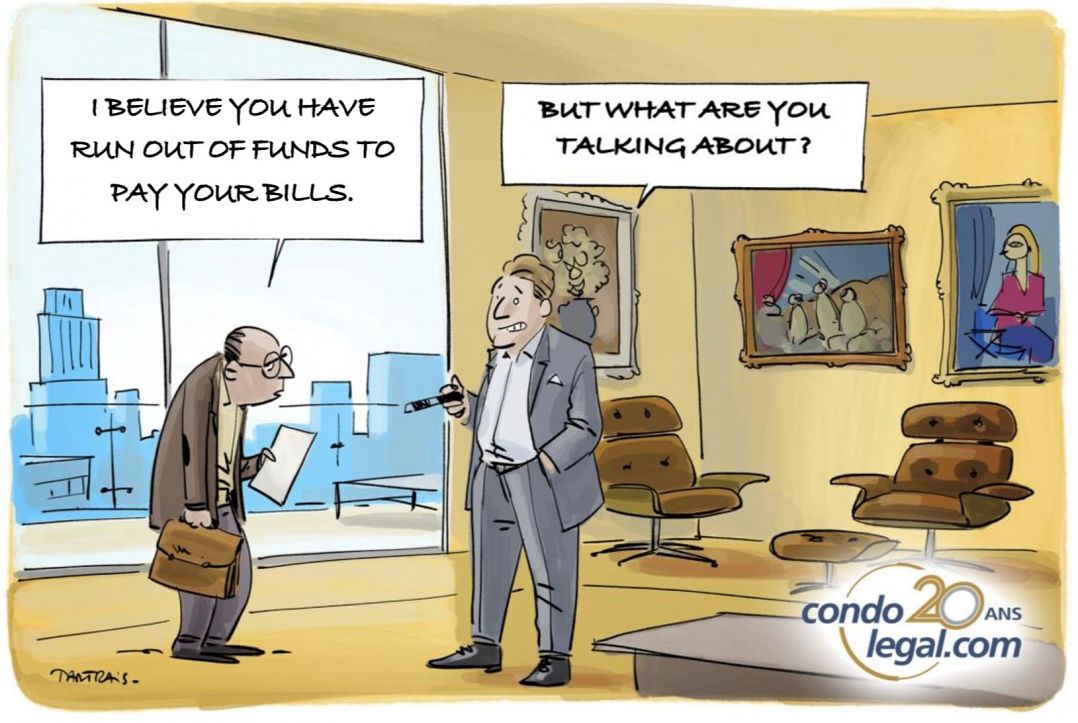Term and end of the mandate of the director
 Section 339 of the Civil Code of Quebec establishes as a basic rule that the term of office of a director is one year. The By-law of the immovable usually describe all the terms and conditions specific to the office of director, including the duration of his mandate. Thus, a syndicate of co-owners may, at the end of the By-law of the immovable, extend the duration of the building to more than one year (for example to two or three years). At the end of the stipulated term, the term of office shall continue if it is not denounced. Consequently, if no co-owner objects to the actions of the directors, they may continue to exercise the powers conferred on them.
Section 339 of the Civil Code of Quebec establishes as a basic rule that the term of office of a director is one year. The By-law of the immovable usually describe all the terms and conditions specific to the office of director, including the duration of his mandate. Thus, a syndicate of co-owners may, at the end of the By-law of the immovable, extend the duration of the building to more than one year (for example to two or three years). At the end of the stipulated term, the term of office shall continue if it is not denounced. Consequently, if no co-owner objects to the actions of the directors, they may continue to exercise the powers conferred on them.
A director remains in office until the next annual meeting, whether before or after the end of one year. He is a director at the meeting until he has been replaced by the election of a new director in order to prevent the syndicate from being without a director in the event that the election cannot be held at that time as a result of an adjournment or otherwise.
Methods of termination of the functions of a director
There are various ways of terminating the duties of directors. First, the term of office of the director has a limited duration, his non-renewal may make it possible to terminate his functions. Secondly, the termination of functions may occur during the term of office by resignation, death, disqualification or dismissal by the meeting of co-owners.
Resignation
A director is not required to remain in office until the end of his term. He may renounce his office and terminate it on his own initiative prematurely. The resignation is effected as soon as it is signed, but often only 30 days later, by virtue of the declaration of co-ownership. To do this, the director has to submit his resignation to the president of the Board of Directors. However, his decision must be carefully considered. It cannot be given without a serious reason and at an inopportune moment and harm the proper functioning of the co-ownership: a hasty departure could give rise to damages. A director will therefore think twice before resigning on a whim. And, if necessary, if he wants to disagree with the rest of the board of directors, rather than resign, he can dissociate himself from the decisions taken by the latter, as authorized by article 337 of the Civil Code of Quebec.
The reasons to resign are varied, such as health or work-related reasons (overwork), relational problems with other members of the Board of Directors, or because a director has sold his apartment. This right is generally not predicated upon any condition such as the prior acceptance of the resignation by the Board of Directors or his replacement by another director. The resigning member must ensure that a current updating statement is filed promptly so that his name no longer appears (as a director) at the “Registraire des entreprises du Québec (REQ)” (Quebec Enterprise Registrar).
Death
Directors are the natural persons who form the board of directors of the syndicate of co-owners, of which they are the mandataries. The mandate is an "intuitu personae" contract. Thus, in the event of the death of the director, his term of office automatically ends. The death of a director entails the obligation to file a current updating declaration with the “Registraire des entreprises du Québec (REQ)” (Quebec Enterprise Registrar) within 30 days of the death, in order to update the information concerning the legal person.
Disqualification for non-payment of common expenses
Article 1086 of the Civil Code of Quebec provides that a co-owner who, for more than three months, has not paid his share of the common expenses (condo fees) is disqualified from being a director. As soon as this happens, he becomes unfit to sit on the board of directors and to perform a legal act in this capacity (e.g. an act of a precautionary nature). However, article 1086 C.c.Q. also provides that the co-owner, who was disqualified from sitting, because of his failure to pay his common expenses for more than three months, and who subsequently pays them, " may then once again be elected as a director". Thus, if he wants to sit again on the board of directors, he will have to be elected again to the board of directors, at a future meeting of co-owners.
Disqualification to perform (for loss of quality)
Article 327 of the Civil Code of Quebec stipulates, in particular, that adults in curatorship and bankrupts are disqualified from exercising the function of director. The fact of losing the conditions of eligibility or eligibility entails the automatic forfeiture of the natural person as director of the syndicate.
Dismissal and prohibition from the function of director
During his term of office, any director may be removed from office by the general meeting of the co-owners or by the person who appointed the director, for example a developer removing his interim director. Where such power is vested in the meeting of the co-owners, removal requires the adoption of a resolution. A vote may be taken at a special meeting or at an annual meeting in the event that the director's term of office has not yet expired.
In addition, the court may, at the request of any interested person, prohibit the exercise of the office of director of a syndicate of co-owners to any person found guilty of an indictable offence involving fraud or dishonesty in a matter related to legal persons, or who has repeatedly violated the laws relating to legal persons or failed to fulfil his obligations as a director.
Vacant director position
If a director’s position becomes vacant, the By-laws of the immovable stipulate its replacement’s provisions. However, if the declaration of co-ownership is silent on this issue, section 340 of the Civil Code of Québec applies as a default clause: “Directors fill the vacancies on the board. Vacancies on the board do not prevent them from acting; if their number is less than a quorum, the remaining directors may validly convene the membersˮ.
Sound and efficient administration: How to achieve it?
It is not necessary for the terms of office of all elected directors to have the same length. In order to ensure the stability of the Board of Directors and the continuity of its member’s actions, it can be beneficial that a syndicate of co-owners provides in the By-laws of the immovable the “staggered renewal of the elected directorsˮ, such as two-year terms, along with an annual election. For instance, in a five-member Board of Directors:
- Two members are elected on even years for a two-year term;
- Three members are elected on odd years for a two-year term.
Thus, it ensures that, from year to year, directors serving during the previous mandate are still in office. This formula is ideal as it favors a form of stability in the administration of the co-ownership, and it nourishes the syndicate’s memory over time. The sudden transition from one board to the next can be brutal, because a syndicate is self-deprived of an otherwise profitable transition phase.
 WHAT YOU SHOULD KNOW! Although a co-ownership director is often a co-owner, the fact that he sells his fraction does not automatically disqualify him as a member of the board of directors. However, the by-law of the immovable could provide otherwise, so that a director must be one of the co-owners of the immovable. If that is the case, that director would become disqualified from sitting on the board of directors.
WHAT YOU SHOULD KNOW! Although a co-ownership director is often a co-owner, the fact that he sells his fraction does not automatically disqualify him as a member of the board of directors. However, the by-law of the immovable could provide otherwise, so that a director must be one of the co-owners of the immovable. If that is the case, that director would become disqualified from sitting on the board of directors.
 WHAT TO KEEP IN MIND: The director’s duty of loyalty to the syndicate is unfailing. If he wishes to withdraw from the Board of Directors, he should do so while respecting a reasonable prior notice, so that his resignation may not be considered faulty.
WHAT TO KEEP IN MIND: The director’s duty of loyalty to the syndicate is unfailing. If he wishes to withdraw from the Board of Directors, he should do so while respecting a reasonable prior notice, so that his resignation may not be considered faulty.
 WARNING! The resignation of one or more members of a Board of Directors often reveals that the co-ownership is in crisis. In such cases, it is likely that things are in disarray between the directors or between co-owners and the Board of Directors.
WARNING! The resignation of one or more members of a Board of Directors often reveals that the co-ownership is in crisis. In such cases, it is likely that things are in disarray between the directors or between co-owners and the Board of Directors.
Back to the super factsheet ''Director''





